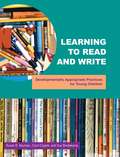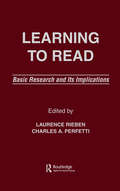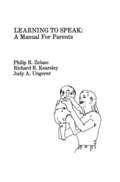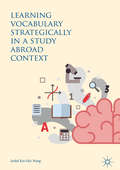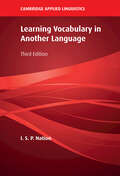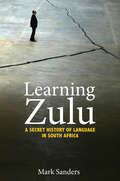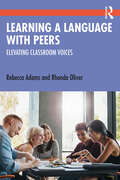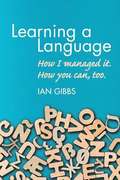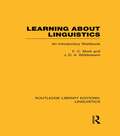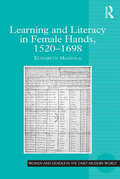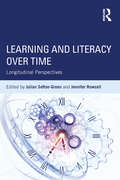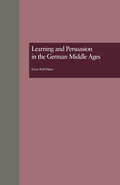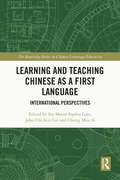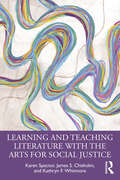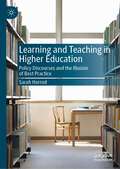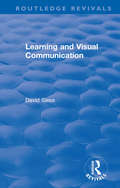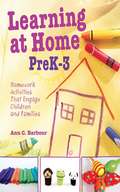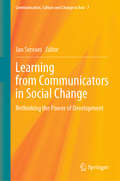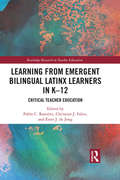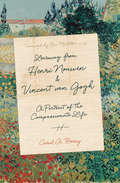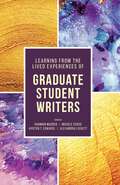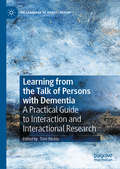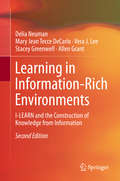- Table View
- List View
Learning To Read And Write: Developmentally Appropriate Practices For Young Children
by Susan B. Neuman Carol Copple Sue BredekampThis book is the product of a professional collaboration between early childhood educators and reading specialists, a team effort in every sense of the word. The issues of how and when to teach young children to read and write are sufficiently important and controversial that our two professional associations felt the need to take an official "position." A position statement is by definition a political document, designed to ad¬dress issues of controversy on which professionals can contribute knowledge and provide recommendations for practice and policy.
Learning To Read: Basic Research and Its Implications
by Charles A. Perfetti Laurence RiebenHow does a young child begin to make sense out of squiggles on a page? Is learning to read a process of extending already acquired language abilities to print? What comprises this extension? How children learn to read, and especially how children are taught to read, are problems of sustained scientific interest and enduring pedagogical controversy. This volume presents conceptual and theoretical analyses of learning to read, research on the very beginning processes of learning to read, as well as research on phonological abilities and on children who have problems learning to read. In so doing, it reflects the important discovery that learning to read requires mastering the system by which print encodes the language. The editors hope that some of the work offered in this text will influence future research questions and will make a difference in the way instructional issues are formulated.
Learning To Speak: A Manual for Parents
by P. R. Zelazo R. B. Kearsley J. A. UngererFirst published in 1984. Routledge is an imprint of Taylor & Francis, an informa company.
Learning Vocabulary Strategically in a Study Abroad Context
by Isobel Kai-Hui WangThis book focuses on case studies of vocabulary strategy use and presents an in-depth account of the vocabulary learning experiences of Chinese students in the UK. It challenges the view that vocabulary strategies result only from learners' cognitive choices, and provides insightful analysis of the interplay between learner characteristics, agency and context in the process of strategic learning. The author makes a strong case for using qualitative methodologies to examine the dynamic, complex and contextually situated nature of strategic vocabulary learning. Drawing on multiple data sources, the book discusses issues that are central to the continuing development of vocabulary strategy research and offers theoretical, research-based and practical suggestions for future exploration. This book will appeal to students and scholars of second language acquisition, vocabulary and applied linguistics.
Learning Vocabulary in Another Language (Cambridge Applied Linguistics)
by I. S. NationVocabulary is now well recognized as an important focus in language teaching and learning. Now in its third edition, this book provides an engaging, authoritative guide to the teaching and learning of vocabulary in another language. It contains descriptions of numerous vocabulary learning strategies, which are supported by reference to experimental research, case studies, and teaching experience. It also describes what vocabulary learners need to know to be effective language users. This new edition has been updated to incorporate the wealth of research that has come out of the past decade. It also includes a new chapter on out of-classroom learning, which explores the effect of the Internet and electronic resources on learning. This vital resource for all vocabulary researchers shows that by taking a systematic approach to vocabulary learning, teachers can make the best use of class time and help learners get the best return for their learning effort.
Learning Zulu: A Secret History of Language in South Africa
by Mark Sanders"Why are you learning Zulu?" When Mark Sanders began studying the language, he was often asked this question. In Learning Zulu, Sanders places his own endeavors within a wider context to uncover how, in the past 150 years of South African history, Zulu became a battleground for issues of property, possession, and deprivation. Sanders combines elements of analysis and memoir to explore a complex cultural history.Perceiving that colonial learners of Zulu saw themselves as repairing harm done to Africans by Europeans, Sanders reveals deeper motives at work in the development of Zulu-language learning--from the emergence of the pidgin Fanagalo among missionaries and traders in the nineteenth century to widespread efforts, in the twentieth and twenty-first centuries, to teach a correct form of Zulu. Sanders looks at the white appropriation of Zulu language, music, and dance in South African culture, and at the association of Zulu with a martial masculinity. In exploring how Zulu has come to represent what is most properly and powerfully African, Sanders examines differences in English- and Zulu-language press coverage of an important trial, as well as the role of linguistic purism in xenophobic violence in South Africa. Through one person's efforts to learn the Zulu language, Learning Zulu explores how a language's history and politics influence all individuals in a multilingual society.
Learning a Language with Peers: Elevating Classroom Voices
by Rhonda Oliver Rebecca AdamsDrawing on experiences of ESOL teachers from around the world, this book provides insights into how peer learning is understood and used in real language classrooms. Based on survey responses, interviews, and observations in a wide range of classroom settings, this book integrates research on peer interaction in second language learning from cognitive and social frameworks with original data on teacher beliefs and practices around the use of peer learning in their teaching. Readers will gain understanding, through teachers' own words, of how peer interaction is used to teach linguistic form, how learners collaborate to develop oral and written communication skills, and how technology is used with peer learning. This book also delineates the ways that current second language peer interaction research diverges from classroom practice and concludes with a classroom-centered research agenda that addresses the nexus of research and practice on second language peer interaction. The book provides a template for integrating research- and practice-based perspectives on second language learning. Language teachers, teacher educators, second language researchers, and advanced students of applied linguistics, SLA, TESOL, and language pedagogy will benefit from this volume’s perspective and unique work.
Learning a Language with Peers: Elevating Classroom Voices
by Rhonda Oliver Rebecca AdamsDrawing on experiences of ESOL teachers from around the world, this book provides insights into how peer learning is understood and used in real language classrooms. Based on survey responses, interviews, and observations in a wide range of classroom settings, this book integrates research on peer interaction in second language learning from cognitive and social frameworks with original data on teacher beliefs and practices around the use of peer learning in their teaching. Readers will gain understanding, through teachers' own words, of how peer interaction is used to teach linguistic form, how learners collaborate to develop oral and written communication skills, and how technology is used with peer learning. This book also delineates the ways that current second language peer interaction research diverges from classroom practice and concludes with a classroom-centered research agenda that addresses the nexus of research and practice on second language peer interaction. The book provides a template for integrating research- and practice-based perspectives on second language learning. Language teachers, teacher educators, second language researchers, and advanced students of applied linguistics, SLA, TESOL, and language pedagogy will benefit from this volume’s perspective and unique work.
Learning a Language: How I managed it. How you can too.
by Ian Gibbs<p>This book is written by someone who, much like yourself, isn't a fanatic. He didn't write a thesis on the subject, he doesn't have a degree or even an 'A' level in any foreign language. His only qualification before writing this book was a CSE grade 4 in Spanish which, ironically, he's quite proud about. Nevertheless, by using the tricks and techniques in these pages, Ian learnt to speak a new language in less than six months. <p>Uniquely, this is a book about language learning written for non-linguists by a non-linguist. He hopes you notice, appreciate and enjoy the difference.</p>
Learning about Linguistics: Linguistics: Learning About Linguistics (Routledge Library Editions: Linguistics)
by J.D.A. Widdowson F.C. StorkThis book offers a workbook approach to linguistics and provides guidelines for the study of language. It aims to give basic information and to indicate something of the background and development of the more important trends in the subject. Each chapter includes exercises which lead the reader outwards from the information given in the text. A list of suggested further reading and references follows each chapter so that each aspect of the subject may be followed up in greater depth if so desired. The book will be of particular use to first-year university students and to students in polytechnics, technical colleges, colleges of education and further education, and, the authors also hope, to many sixth-formers in secondary schools. It will also be of interest to the general reader who wishes to learn about linguistics.
Learning and Literacy in Female Hands, 1520-1698 (Women and Gender in the Early Modern World)
by Elizabeth MazzolaFocusing on the unusual learning and schooling of women in early modern England, this study explores how and why women wrote, the myriad forms their alphabets could assume, and the shape which vernacular literacy acquired in their hands. Elizabeth Mazzola argues that early modern women's writings often challenged the lessons of their male teachers, since they were designed to conceal rather than reveal women's learning and schooling. Employed by early modern women with great learning and much art, such difficult or ’resistant’ literacy organized households and administrative offices alike, and transformed the broader history of literacy in the West. Chapters treat writers like Jane Sharp, Anne Southwell, Jane Seager, Martha Moulsworth, Elizabeth Tudor, and Katherine Parr alongside images of women writers presented by Shakespeare and Sidney. Managing women's literacy also concerned early modern statesmen and secretaries, writing masters and grammarians, and Mazzola analyzes how both the emerging vernacular and a developing bureaucratic state were informed by these contests over women's hands.
Learning and Literacy over Time: Longitudinal Perspectives
by Julian Sefton-Green Jennifer RowsellLearning and Literacy over Time addresses two gaps in literacy research—studies offering longitudinal perspectives on learners and the trajectory of their learning lives inside and outside of school, and studies revealing how past experiences with literacy and learning inform future experiences and practices. It does so by bringing together researchers who revisited subjects of their initial research conducted over the past 10-20 years with people whom they encountered through ethnographic or classroom-based investigations and are the subjects of previous published accounts. The case studies, drawn from countries in three continents and covering a range of social worlds, offer an original and at times quite an emotive interpretation of the effects of long-term social change in the UK, the US, Australia and Canada; the claims and aspirations made by and for certain kinds of educational interventions; how research subjects reflect on and learn from the processes of being co-opted into classroom research as well as how they make sense of school experiences; some of the widespread changes in literacy practices as a result of our move into the digital era; and above all, how academic research can learn from these life stories raising a number of challenges about methodology and our claims to 'know’ the people we research. In many cases the process of revisiting led to important reconceptualizations of the earlier work and a sense of 'seeing with new eyes’ what was missed in the past. The reflections on methodology and research processes will interest postgraduate and academic researchers. The studies of change and of long-term effects are widely relevant to teacher educators and scholars in language and literacy education, educational anthropology, life history research, media and cultural studies, and sociology.
Learning and Persuasion in the German Middle Ages: The Call to Judgment (Garland Studies in Medieval Literature #Vol. 15)
by Ernst Ralf HintzFirst published in 1997. Routledge is an imprint of Taylor & Francis, an informa company.
Learning and Teaching Chinese as a First Language: International Perspectives (The Routledge Series on Chinese Language Education)
by Lee, John Chi-Kin Chung Mou Si Lam, Sin Manw SophiaIn this book, the authors embark on a critical investigation of the complex field of Chinese language education, with a particular focus on exploring new trends and teaching and learning. They delve into the intricacies of language, education and its effectiveness in teaching Chinese as a first language.The book has three objectives: establishing a field of study in Chinese language learning and teaching, providing critical discussion and progressive insights on language education, and offering relevant pedagogical perspectives of learning and teaching Chinese as L1 and L2. The chapters investigate learning and teaching of Chinese in different aspects, including four skills, culture, literature, technology-assisted learning, and learners’ identity. By focusing on the teaching practices of Chinese at different levels, it sheds light on teaching Chinese as a first language. Theoretically, it broadens the linguistic and geographical reach of previous works on language education that mainly examine English as a lingua franca or children’s first language acquisition. Drawing upon theories in language learning, the book demonstrates the applicability of language theories in the first language and Chinese as a non-alphabetic language and examines the impact and effectiveness of some theories in Chinese learning and teaching.Academic researchers, teacher educators, teachers and students interested in Chinese language and education will find this a highly relevant text for its focus on curriculum, pedagogy and assessment of teaching Chinese as a first language.
Learning and Teaching Literature with the Arts for Social Justice
by James S. Chisholm Kathryn F. Whitmore Karen SpectorThis text invites pre-service teachers to explore arts-informed practices that showcase the transformative potential of literature in the classroom. Through the lens of "stories-we-live-by," the authors recognize literature as interference, capable of disrupting the habitual patterns through which we interpret the world in order to reawaken the capacity of students and teachers alike to change. Chapters are designed to inspire students’ love of literature by fostering literary and artful encounters that provoke their thinking and sense-making. Each chapter includes engaging pedagogical features that spark thinking and analysis of literature and invite readers to further engagement. The appendices include directions for instruction as well as additional resources. An essential text for courses on children’s and adolescent literature and English methods, pre-service teachers will come away with plenty of text recommendations and arts- and social justice-informed practices to use with their future students. Through artful encounters with visual learning analyses, visual-verbal journals, drama, soundscapes, poetry, and so much more, readers examine their own transformative experiences with literature. Readers will learn to craft and curate practices that encourage engagement, imagination, experimentation, and self-awareness in and beyond the classroom.
Learning and Teaching in Higher Education: Policy Discourses and the Illusion of Best Practice
by Sarah HorrodThis book explores the discourses in learning and teaching policy in UK higher education, traces how these ideas are recontextualised at institutional level and reveals the differences between policy discourses and lecturers’ and students’ experiences. The author argues that policy ideas around learning and teaching are not simply value-free ‘best practice’ but reflect the socio-political context of higher education. The study uses an innovative conceptual framework of critical discourse studies (CDS) and Bernstein’s sociology of pedagogy to provide critical lenses to uncover the underlying messages of policy. The book will interest a wide academic audience including anyone involved in higher education globally.
Learning and Teaching in the Early Years
by Jane Page Collette TaylerLearning and Teaching in the Early Years provides a comprehensive, contemporary and practical introduction to early childhood teaching in Australia. A strong focus on the links between theory, policy and practice firmly aligns this text with the Early Years Learning Framework. Written for students of early childhood programs, this book covers learning and development, as well as professional practice in teaching children from birth to eight years. In recognition of the evolving role of educators, topic areas include learning, teaching, working with families, leading, advocating and researching. Each chapter contains learning objectives, key terms and reflection points. Detailed case studies document the intersection between research, policy and practice, enhancing pre-service and practicing educators' appreciation of how a policy-aligned approach reinforces learning and development in the early years. This text draws on the latest research to present children's learning as a dynamic and active process requiring specific, intentional teaching behaviours.
Learning and Visual Communication (Routledge Revivals)
by David SlessOriginally published in 1981, Learning and Visual Communication is about how to use visual communication in education. It offers visual forms of communication. In order to do this it draws on recent research - at the time of publication - in psychology, philosophy, semiotics, cultural analysis, education and media studies. Visual thinking, the key concept of the book, is defined in psychological and philosophical terms. It is placed in its cultural context and it is argued that it has not received the attention that it deserves in our educational system, which is dominated by literacy and numeracy. This is despite the increasing use of visual communication as an aid to learning and as a source of basic data in a whole range of disciplines such as physical science, geography, history and anthropology amongst others.
Learning at Home Pre K-3: Homework Activities that Engage Children and Families
by Ann C. BarbourFamilies play a critical role in helping young children develop a solid academic foundation and love of learning. Numerous examples have proven time and again that children's learning behavior is strongest when reinforced with activities, social interactions, and play. In Learning at Home, PreK-3, Ann Barbour stresses the importance of getting parents involved with their children's education through engaging homework activities. Bursting with activities to foster learning on many levels, this book also offers ideas for teachers on how to include parents in their children's education. Discover hundreds of fun activities designed to:Relate learning directly to children's own experiencesInclude shared reading experiences, family projects, and gamesIntegrate developmental and content areas, including language and literacy, mathematics, science, and the creative artsPromote literacy learning in homes where English is not the primary languageAnd moreThis book gives teachers the tools to reach out to families and provides parents with the guidance to reinforce learning both in school and at home. Complete with tips on how to encourage parent involvement, data to support family commitment to the child's education, and activities that young students will enjoy doing at home with their families, Learning at Home is a fantastic resource to promote the joy of learning at home.
Learning from Communicators in Social Change: Rethinking the Power of Development (Communication, Culture and Change in Asia #7)
by Jan ServaesThis book presents the perspectives of some of the main players, both academics and professionals, in communication for sustainable development and social change so as to provide valuable lessons for future generations of change agents. It places emphasis on both the theoretical foundation and practical applications and ethical concerns in communication for development and social change. Most of the available historical accounts in development communications make a distinction between the modernization paradigm, the dependency paradigm and the multiplicity or participatory paradigm. These historical accounts have been dominated by framing developments within these paradigms, as the logical offspring of the Western drive to develop the world after colonization and the Second World War. The subsequent collapse of the Soviet Union in the late eighties, together with the rise of the U.S. as the only remaining ‘superpower,’ the emergence of the European Union and China, the gradual coming to the fore of regional powers, such as the BRICS countries, and the recent meltdown of the world financial system has rendered disastrous consequences for people everywhere. This book responds to these changes and challenges in presenting a rethinking of the “power” of development, and consequently the place and role of communication in it. It is aimed at both emerging research students, policymakers and social research practitioners who are interested in the history of communication for development and social change and the role and place of mayor players in it. This is most applicable to the political and educational sector, as well as scholars of history, social work, and human rights. The book will provide valuable insights for beginners in these fields who are not yet familiar with the increasingly important and emerging field of global social change.
Learning from Emergent Bilingual Latinx Learners in K-12: Critical Teacher Education (Routledge Research in Teacher Education)
by Pablo C. Ramirez Christian J. Faltis Ester J. De JongIn this volume, scholars, researchers, and teacher educators from across the United States present their latest findings regarding teacher education to develop meaningful learning experiences and meet the sociocultural, linguistic, and academic needs of Latino ELLs. The book documents how teacher education programs guide teachers to engage in culturally and linguistically diverse academic contexts and sheds light on the variety of research-based theoretical frameworks that inform teaching practices. A unique contribution to the field, Learning from Emergent Bilingual Latinx Learners in K-12 provides innovative approaches for linking Latino school communities with teachers at a time when demographic shifts are considerably altering population trends in the K-12 educational system.
Learning from Henri Nouwen and Vincent van Gogh: A Portrait of the Compassionate Life
by Carol A. BerryCarol Berry and her husband met and befriended Henri Nouwen when she sat in his course on compassion at Yale Divinity School in the 1970s. At the request of Henri Nouwen's literary estate, she has written this book, which includes unpublished material recorded from Nouwen's lectures. As an art educator, Berry is uniquely situated to develop Nouwen's work on Vincent van Gogh and to add her own research. She fills in background on the much misunderstood spiritual context of van Gogh's work, and reinterprets van Gogh's art (presented here in full color) in light of Nouwen's lectures. Berry also brings in her own experience in ministry, sharing how Nouwen and van Gogh, each in his own way, led her to the richness and beauty of the compassionate life.
Learning from the Lived Experiences of Graduate Student Writers
by Michele Eodice Kirsten T. Edwards Alexandria Lockett Shannon MaddenLearning from the Lived Experiences of Graduate Student Writers is a timely resource for understanding and resolving some of the issues graduate students face, particularly as higher education begins to pay more critical attention to graduate student success. Offering diverse approaches for assisting this demographic, the book bridges the gap between theory and practice through structured examination of graduate students’ narratives about their development as writers, as well as researched approaches for enabling these students to cultivate their craft. The first half of the book showcases the voices of graduate student writers themselves, who describe their experiences with graduate school literacy through various social issues like mentorship, access, writing in communities, and belonging in academic programs. Their narratives illuminate how systemic issues significantly affect graduate students from historically oppressed groups. The second half accompanies these stories with proposed solutions informed by empirical findings that provide evidence for new practices and programming for graduate student writers. Learning from the Lived Experiences of Graduate Student Writers values student experience as an integral part of designing approaches that promote epistemic justice. This text provides a fresh, comprehensive, and essential perspective on graduate writing and communication support that will be useful to administrators and faculty across a range of disciplines and institutional contexts. Contributors: Noro Andriamanalina, LaKela Atkinson, Daniel V. Bommarito, Elizabeth Brown, Rachael Cayley, Amanda E. Cuellar, Kirsten T. Edwards, Wonderful Faison, Amy Fenstermaker, Jennifer Friend, Beth Godbee, Hope Jackson, Karen Keaton Jackson, Haadi Jafarian, Alexandria Lockett, Shannon Madden, Kendra L. Mitchell, Michelle M. Paquette, Shelley Rodrigo, Julia Romberger, Lisa Russell-Pinson, Jennifer Salvo-Eaton, Richard Sévère, Cecilia D. Shelton, Pamela Strong Simmons, Jasmine Kar Tang, Anna K. Willow Treviño, Maurice Wilson, Anne Zanzucchi
Learning from the Talk of Persons with Dementia: A Practical Guide to Interaction and Interactional Research (The Language of Mental Health)
by Trini StickleThis book offers an in depth analysis of the interactional challenges that arise due to various dementias and in a variety of social contexts. By assessing conversations between persons with dementia and their family members, caregivers, and clinicians, it shares insights into both the language and actions selected by the participants. Using several different research methods, authors highlight competencies and areas of struggle, as well as choices that ease interactions along with those that seem to complicate them. Each chapter provides practical strategies to help readers better navigate day-to-day interactions with persons with dementia. The book is part of a continuing effort to offer guidance and hope to those for whom such conversations have become part of their daily lives. It presents concrete recommendations for specific groups such as family members, caregivers, and clinicians; it will also be of interest to researchers in the field of dementia and early career scholars interested in the methodologies discussed.
Learning in Information-Rich Environments: I-LEARN and the Construction of Knowledge from Information
by Delia Neuman Mary Jean Tecce DeCarlo Vera J. Lee Stacey Greenwell Allen GrantThe amount and range of information available to today’s students—and indeed to all learners—is unprecedented. If the characteristics of “the information age” demand new conceptions of commerce, national security, and publishing—among other things—it is logical to assume that they carry implications for education as well. Little has been written, however, about how the specific affordances of these technologies—and the kinds of information they allow students to access and create—relate to the central purpose of education: learning. What does “learning” mean in an information-rich environment? What are its characteristics? What kinds of tasks should it involve? What concepts, strategies, attitudes, and skills do educators and students need to master if they are to learn effectively and efficiently in such an environment? How can researchers, theorists, and practitioners foster the well-founded and widespread development of such key elements of the learning process? This second edition continues these discussions and suggests some tentative answers. Drawing primarily from research and theory in three distinct but related fields—learning theory, instructional systems design, and information studies—it presents a way to think about learning that responds directly to the actualities of a world brimming with information. The second edition also includes insights from digital and critical literacies and provides a combination of an updated research-and-theory base and a collection of instructional scenarios for helping teachers and librarians implement each step of the I-LEARN model. The book could be used in courses in teacher preparation, academic-librarian preparation, and school-librarian preparation.
